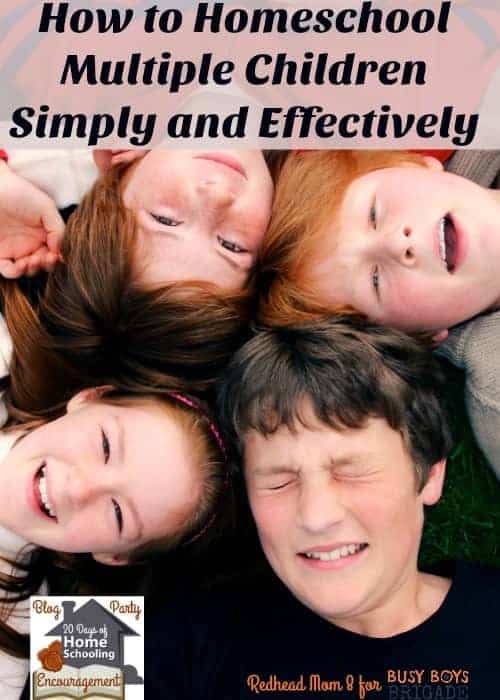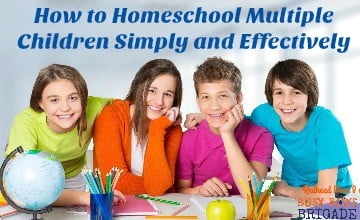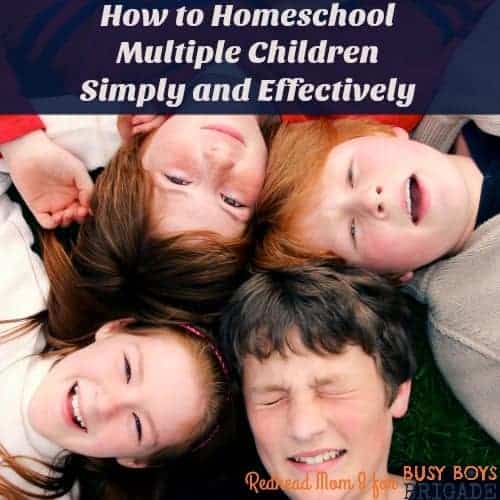How to Homeschool Multiple Children Simply and Effectively
This post may contain affiliate links. Please read my disclosure statement. Thanks for visiting!
 As a busy mom of 11 kids, I know firsthand how intimidating the prospect of homeschooling multiple children can be. In fact, just yesterday I had a complete stranger ask me why I would take on such an enormous task.
As a busy mom of 11 kids, I know firsthand how intimidating the prospect of homeschooling multiple children can be. In fact, just yesterday I had a complete stranger ask me why I would take on such an enormous task.
And you know what? That's a really good question. Most people just don't realize that homeschooling is not like school. When the subject is brought up, they imagine me frantically running around a classroom trying to simultaneously meet everyone's needs.
To be quite honest, if our homeschool did look like that, I'd very likely be putting my kids on the little yellow school bus down the street. But in reality, it's not like that at all....thank God!
We're currently beginning our eighth year of homeschooling. During this journey, I've tried just about every homeschool method out there. After much trial and error, we've settled into a routine that incorporates pieces of almost every style, yet remains true to the one foundation that this homeschool mama needs: simplicity and effectiveness.

Top 5 Principles To Homeschool Multiple Children Simply & Effectively
1.Focus on the 3 Rs. Yep. Good old reading, writing, and 'rithmetic. Up until high school age, these are the only subjects we do actual book work for. Since all of the other subjects can easily be explored through hands-on learning, day to day living, read-alouds or independent reading, and visual media, we save our actual 'table time' to establish and reinforce the skills my kids will unquestionably need for not only future academic success, but life, in general. To be clear, my kids do not all sit down at the same time to do this work together. This is the one area of our homeschool where I only work with one child at a time to allow them my undivided attention and minimum distractions.
2.Keep book work short. I am a firm believer in keeping these types of assignments short and sweet. Nothing kills the joy of learning more than endless, repeated drills.
Take, for example, language arts. While many consider this to be one subject, in reality it encompasses grammar, reading, penmanship, writing, spelling/vocabulary, and sometimes oral narration. After years of homeschooling, I'm telling you that you do not need a separate book for each of these topics. We use a book or copywork, depending on the age, for grammar, and we use spelling books. That's it. We use oral and written narration to address reading, writing, and penmanship. What better way to learn these things than by using these skills for assignments that have a real-life context, instead of pages in a workbook?
We also do not do both spelling or grammar everyday. We alternate days between the two of them. As for math, I try not to make them spend more than 20 minutes on this subject. If a math page has too many problems, I'll usually assign every other problem. If they get them right, they're done. If not, we work on some of the remaining problems or correct the wrong answers by doing them on the whiteboard.
3.Make good use of unit studies. Unit studies are one of my all-time favorite resources for homeschooling my large family since they are designed to be used by multiple ages and are cross-curricular. If you are unfamiliar with this method, your family will focus on one topic or, perhaps, a book. From this starting point, you simply branch off into new topics that seamlessly arise out of the original.
For example, we once did a unit study on the Little House series. We learned about pioneers, frontier life, the Osage Native American tribe, how to make molasses, we baked and cooked all sorts of period dishes, the railroad, spelling bees, animal trapping, and we even threw in some related living math problems for good measure. Since we weren't focusing on subjects and, instead, simply focused on learning, not only was it enjoyable, but we were able to do it together.
Another benefit of unit studies- no textbooks required! The vast majority of our literary resources come from the library, which, I think we all know, are much more interesting to read, hence, are easier to learn from. While many people do come up with unit studies on their own, there are some wonderful unit study curriculums out there, and there are also endless free unit studies to be found by just the click of a mouse!
4.Avoid thinking in terms of grade levels. Since most homeschooling parents come from traditional school backgrounds, it can be very easy for us to fall into the mindset that we grew up with: kids of certain ages should be doing certain things. It's important to remember that schools do this because they have more students and less resources. It's much more manageable to teach a class of thirty students if they are all capable of generally doing the same level work. That's the only reason it's done that way. So if the idea of your 7th grader doing a unit study with your 4th grader makes you nervous, just remember that fact. Your children are individuals and will develop at their own pace, and that is okay.
I do, however, think in terms of ability. The beauty of unit studies is that, although all of the children are learning together and focusing on the same topic, it is very easy to adjust things to meet the unique needs of each child. For example, if your children plan on researching the life cycle of a frog, there are a variety of options depending upon the children in question. Younger children could draw a picture or diagram, children who are a little more advanced could write facts or practice writing a paragraph, while other children may decide to write an essay or a report.
5. Give your older children the opportunity to work independently. As children get into the teenage years, oftentimes they've reached the point where they are ready to 'take the reins' on their education. Let them plan their schedule, choose what they will learn about, and how they will learn it. Older kids who are given a say in their homeschool routine are more likely to take more pride in their work because they know that it was something that they, themselves, set forth to do.
[bctt tweet="How To #Homeschool Multiple Children Simply & Effectively from a mom of 11. Pt of #20DaysHSEncouragement #ihsnet" username="busyboysbrigdade"]
 Conclusion:
Conclusion:
I wish you could be a fly on the wall of our homeschool for just one day so that you can see how truly manageable it is to homeschool multiple children. Rather than being hours and hours of endless frustration, our homeschool days are filled with laughter, excitement, and, yes, abundant learning.
